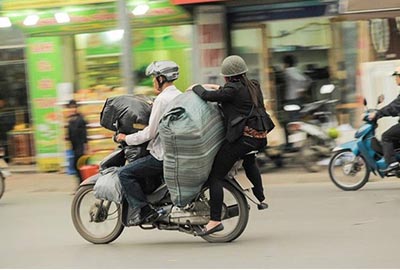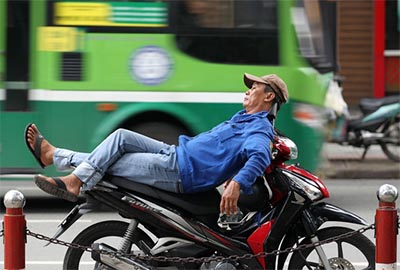Watch any travel documentary about Ho Chi Minh City or Hanoi, and you’ll see motorbikes everywhere! Vietnam traffic is jam-packed with these motorized vehicles. It might seem as if everyone in this country has one.
You wouldn’t be wrong in thinking that. Vietnam has a population of nearly 100 million people, and there are 50 million motorbikes there. As of 2021, the country has the second-largest motorbike usage in the world after Thailand. Motorbikes in Vietnam are a significant part of everyday life woven into people’s daily commute, social life, and business.
So, why are these two-wheel vehicles so prevalent in Vietnam, and what is their impact?
Vietnam has many tiny roads, alleyways, and passageways that make it difficult for larger vehicles to pass through. Motorbikes are by far the best way to navigate these types of roads. This maneuverability makes it possible to connect more rural areas with larger cities.
 #2 Motorbikes Can Carry Everything
#2 Motorbikes Can Carry Everything Motorbikes might be small, but they sure are mighty! They are the Vietnamese version of a station wagon. People have miraculously loaded up store signs, crates, entire families, and you name it on their vehicles. It’s pretty impressive how many things can fit onto such a small motorbike.
Motorbikes are an affordable mode of transportation in Vietnam. A motorbike’s cost can range from 700 to 4,000 USD for a brand-new motorbike. This pricing makes them much more accessible to purchase than a car.
Public transportation is not an effective mobility option for most Vietnamese people. This type of transportation meets less than 1% of Vietnamese people’s travel needs. The situation is slightly better in Vietnam’s two largest cities, but there is still a public transportation shortage. Motorbikes fill the need for quality transportation options.
 Vietnamese people have been using motorbikes for so long that it has become a significant part of the culture. They are a part of the country’s infrastructure and cultural practices. Street vendors with baskets of food drive-by hungry customers and deliver meals. People hang out, transport goods, and even take naps on them!
Vietnamese people have been using motorbikes for so long that it has become a significant part of the culture. They are a part of the country’s infrastructure and cultural practices. Street vendors with baskets of food drive-by hungry customers and deliver meals. People hang out, transport goods, and even take naps on them!
The high volume of motorbikes in Vietnam has a societal and environmental impact. Threats that these vehicles have on daily life include traffic jams along with air and noise pollution.
Some studies have shown that motorbikes are not as environmentally friendly as some researchers initially thought. While they consume less fuel and expend less carbon dioxide than a car, they produce other harmful chemicals such as smog-forming hydrocarbons, nitrogen oxides, and carbon monoxide.
There hasn’t been significant progress on controlling the number of motorbikes in Vietnam.
More alternative forms of transportation are needed to offset the negative impacts motorbike have on society and the environment.
Whether you like them or not, motorbikes are a staple in Vietnam for the foreseeable future.
While this mode of transport likely won’t go anywhere soon, riding a bike is an eco-friendly alternative serving many of the same functions.
If you are interested in seeing Vietnam through a bicycling tour, start your journey by visiting the More Fun Travel website.